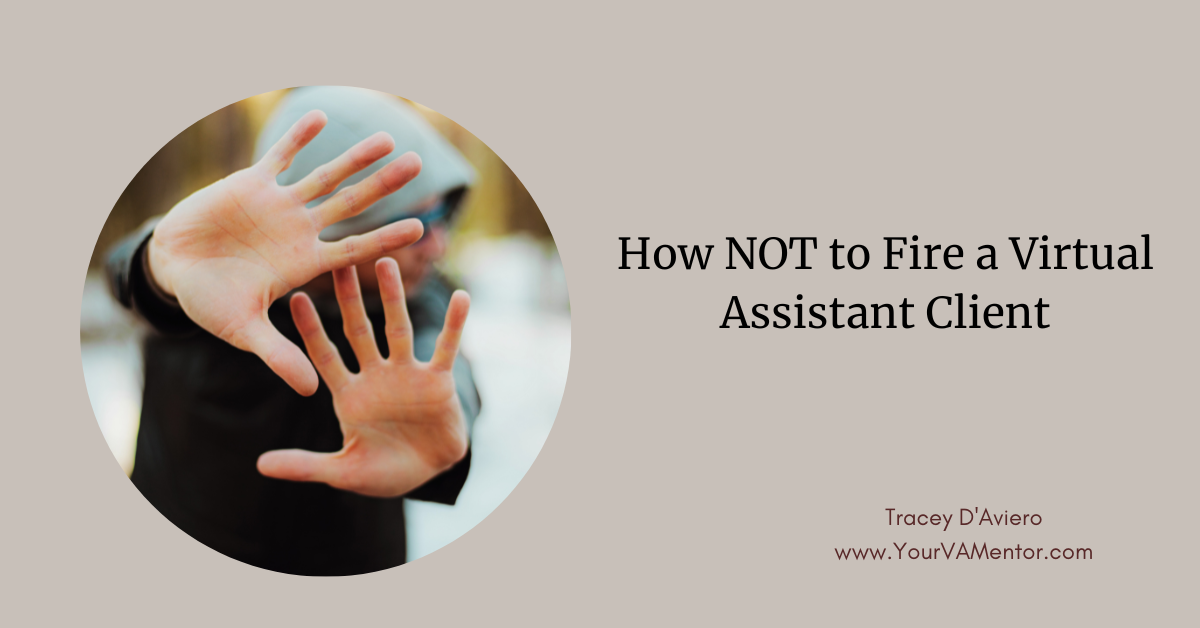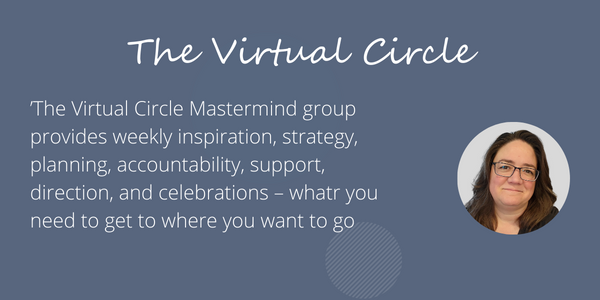This is an important subject. Pull up with a cup of tea and read it. How not to fire a client (or how to graciously be fired, as the case may be).
I had a conversation with an entrepreneur this week about how she made some changes in her business, and decided to go a different route with support.
That meant that she had to cut ties with a VA she had worked with for a number of years.
It didn’t go well.
It inspired me to write this article because this is a very important thing to GET RIGHT as a business owner.
It’s never easy when you stop working with a client. Especially if it’s their decision.
It’s like coming to the end of a relationship. Well, it really is.
But in business, that’s all it is – it’s not personal, it’s business.
And frankly, if a client wants to go in another direction for ANY reason at all, that is their prerogative. It’s their business, not yours.
Just like you get to decide what happens, and when, in your business, they get to as well.
So … this story the entrepreneur told me is not isolated. I get a lot of people talking to me about how things go sour. It happens.
Virtual assistants who find themselves micromanaged or bullied by clients who treat them like employees.
Clients who get ghosted by VAs or get overbilled, or just spend too much time trying to communicate their needs.
Or sometimes personalities just don’t mesh. I had a client once who had ADHD and I could not support him in the way he needed. I loved him but I wasn’t the best person for him so we found him a new VA. (He made a lot of last minute changes to everything we did and I was a very busy VA at the time and it derailed my schedule a lot, so it just was not working out.)
There are a lot of reasons that things don’t work out with a client.
It’s JUST business. We move along and we find a better client, or they find a better VA.
We can’t take it personally. Business is hard enough.

The VA I describe above did some rotten things to the client when they got fired. Please don’t do that if it happens to you. It’s not worth it!
Here is how not to fire a client:
1. Do not be a jerk.
Always be professional. Name calling or other rude behavior is simply not where you want to go as a professional business person.
2. Do not remove access to any of their stuff.
Whether it’s a website, a project management system, a bookkeeping platform or whatever – do not remove access to what is theirs simply because you are mad. (If it’s a deliverable they haven’t paid for, there is an exception, but in this case I mean anything that is their business property.)
3. Do not ruin your own reputation.
The client you are working with knows people, and you don’t want them telling others how you handled the breakup. Always leave a relationship as intact as possible.
4. Don’t let things become toxic.
Make sure things don’t go too far by the time one of you decides it’s over. If you consistently get upset by a client, fix the situation promptly, or make the decision to move along from them.
5. Don’t take your issue online.
As much as it probably feels good to get pats on the back from your VA colleagues, it’s a public forum when you post online, and it’s not a good idea. (I see it ALL the time in the VA groups, you need to remember that many groups let clients in them too, and they are watching you …) If you need to vent or get advice, do it privately with a trusted colleague or group of colleagues.
Here is what to do instead:
Work Towards Final Date
When is the final date you will work together? Put it on your calendar and work towards it. If things have gone sour, there may not be any notice. Be sure that you follow your contract terms if you are letting go of a client.
Project List to Complete
What needs to be completed by the final date? Be professional and help them get things done. You don’t have to do everything if you don’t feel it’s required, but be sure you communicate to the client what will done and how it will work.
Training New Support
Some clients will ask you to train their new support staff. You have no obligation to do so. But you should at the least leave them the access details and a general summary of what gets done when, and using which systems. It’s the professional thing to do
Offboarding Process
If you don’t have one, you should create an offboarding process. I recommend a 30 day termination ‘in writing’ clause in your contract for a client to stop working with you. And then a one or two week offboarding process that helps you provide basic instructions/procedures to the client for their new support.
Be Ethical
You never know how someone will react when things go sour. We see lots of evidence to that effect in the news. Be ethical. Be professional right till the very end, even if it’s difficult. Don’t open yourself up for a legal or ethical battle – it’s simply not worth it. It’s just business.
Grin and Bear It
You may not get your 30 days, or extra pay from a client you are breaking up with. If they don’t agree to pay the final 30 days then you are not obligated to hang in there, but as much as you can, I recommend grinning and bearing it to offload them. It makes for a more professional finish to your relationship and then when they are speaking with their colleagues, they will remember how helpful you were when it was time to part ways.
People remember the last conversations or few weeks they have with you. It’s an opportunity for you to do it well, and then move on.
Having said all of that, sometimes the clients are the unreasonable ones. But from this article I hope you get some tips on how to handle yourself if you want to fire a client, or if you get fired yourself.
Make sure you get paid what you are owed – but even if that goes badly in the end, do what you can to get away unscathed (and then adjust your terms and policies for your new clients by having them pay you up front!).
Hold your head up high, offboard them as smoothly as possible, and get the heck out! You’ll be a more respected Virtual Assistant as a result – and once you’ve done that once, you’ll realize how much better it feels too!
How did things wind up with that VA/client I told you about? Well, not good. The client wanted advice from me on what to do – and I told her I would have taken legal action against the VA. And I don’t give that advice lightly. Even though I only spoke with the client in this case, the VA cost the client financially – and that’s simply illegal. Don’t be like that VA. It’s not personal, it’s just business. Protect yours!
What You Should Do Next:

If you need some help to get your policies, terms, onboarding or offboarding processes together, The Virtual Circle is where you need to be. It is a small group of professional VAs who are getting things done in their business through weekly support and training. It’s a low cost, high-value coaching alternative to private coaching. A monthly mastermind group that helps you get to where you want to go.
If you are struggling through your VA business, check out this group to see if it’s the right time for you! Registration is open now.